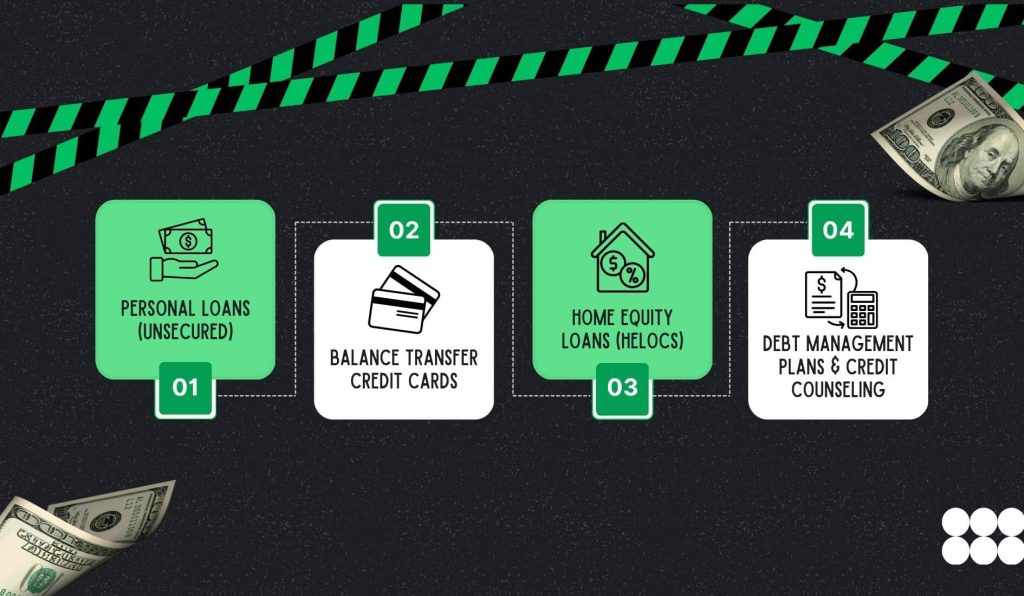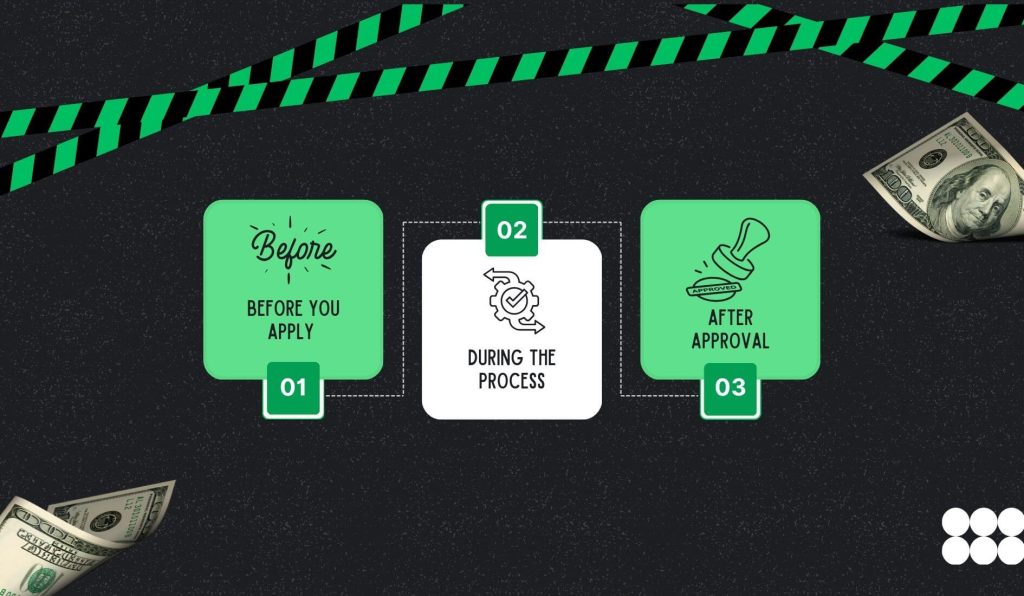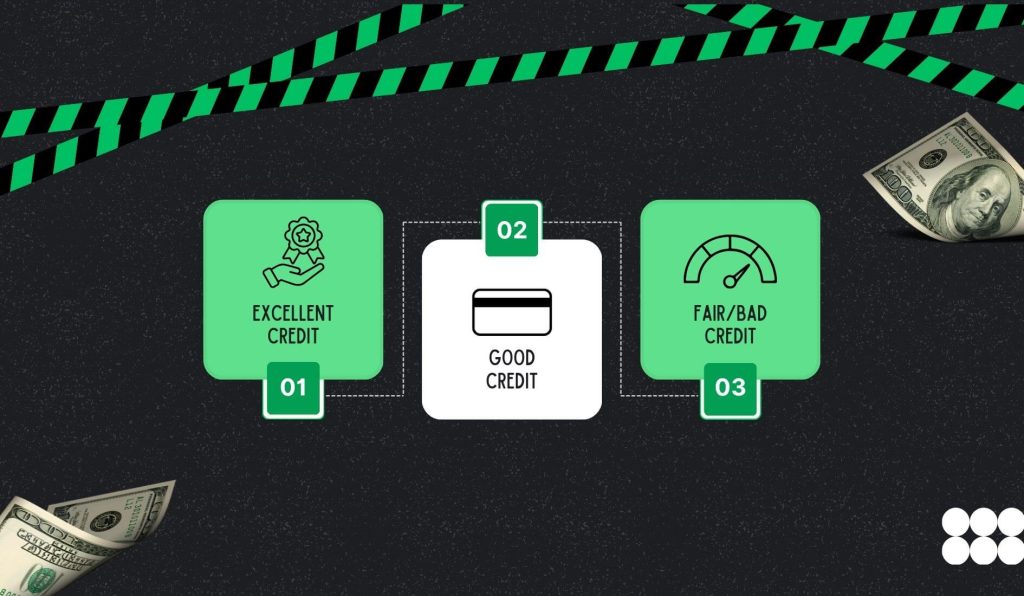- Questions to Ask Yourself for Debt Consolidation Eligibility
- Major Types of Debt Consolidation Loans
- 1. Personal Loans (Unsecured)
- 2. Balance Transfer Credit Cards
- 3. Home Equity Loans (HELOCs)
- 4. Debt Management Plans & Credit Counseling
- The 7-Point Lender Evaluation Checklist
- Real Examples & Mini-Calculator
- How to Apply for a Debt Consolidation Loan? - Essential Steps
- Before You Apply
- During the Process
- After Approval
- Real Savings Computational Formula
- Major Steps to Take for Safety
- Choosing a Debt Consolidation Loan by Borrower Profile
- 1. Excellent Credit
- 2. Good Credit
- 3. Fair/Bad Credit
- Post-Consolidation Plan: 90-Day Behavioral Playbook!
- Cost Comparison Table
- Expert Tips & Final Checklist
- Frequently Asked Questions (FAQs)
Tips to Choose the Right Debt Consolidation Loan for You

In theory, debt consolidation is quite simple. Basically, you take multiple debts (credit cards, personal loans, maybe even medical bills) and roll them into one. In this case, you have one payment and one due date. Ideally, one lower interest rate.
That is the pitch. And for many, it works especially if you are juggling high-interest credit cards and are looking for a breathing space.
Meanwhile, the Consumer Financial Protection Bureau (CFPB) says that consolidation helps if it reduces your total interest and simplifies your finances. However, it is not a magic fix. This is because you still owe the money, but in a different way.
Therefore, read on to get a better idea of how to choose the right debt consolidation loan for yourself.
Questions to Ask Yourself for Debt Consolidation Eligibility
At the outset, ask yourself the following five questions:
- Are your current interest rates above 18%?
- Will you qualify for a lower APR (as per your credit score)?
- Is your income stable enough to handle fixed monthly payments?
- After consolidation, are you willing to close your credit cards?
- Will you be able to resist racking up new debt(after the old balances are gone)?
Basically, your score determines whether you are eligible for a debt consolidation loan or not. Here are the scores:
- 4–5 Yes: You are likely a good candidate. Start comparing offers.
- 2–3 Yes: Proceed with caution. Consider counseling or hybrid options.
- 0–1 Yes: Consolidation might not help. Explore alternatives.
Major Types of Debt Consolidation Loans

The following are the major types of debt consolidation loans you must be aware of:
1. Personal Loans (Unsecured)
This is the most common route. This is because a personal loan for debt consolidation does not need collateral. Moreover, APRs range from 6% to 36%, depending on credit, while terms usually run 2 to 7 years.
Meanwhile, if your credit is decent, you might land a rate under 12%. That is a win if your cards are charging 25% or more.
Do you know? In general, the average personal loan APR is around 12.25% as of this year.
2. Balance Transfer Credit Cards
In general, these loans offer 0% APR for 12–21 months. Although it sounds great, there is a catch. For instance, transfer fees (3–5%)and the risk of not paying it off before the promo ends.
Hence, you must calculate your break-even point. If you pay off the balance before the intro period ends, it is a solid move. Otherwise, the regular APR comes in, and it is mostly brutal (20%+).
3. Home Equity Loans (HELOCs)
If you own a home, this might be your cheapest option. However, it is risky as you are putting your house on the line. Also, APRs are lower (mostly 5–9%), but there are closing costs. Meanwhile, if you default, you might end up losing your home.
Hence, the CFPB warns borrowers to consider this if they are confident in their repayment ability.
4. Debt Management Plans & Credit Counseling
Sometimes, loans are not the answer. In fact, a nonprofit credit counselor might negotiate lower interest rates with your creditors. This way, you make one payment to the agency, and they pay your creditors.
Hence, it is not a new loan. Also, there is no credit check. Moreover, the CFPB recommends this for people with poor credit or unstable income.
The 7-Point Lender Evaluation Checklist
Depending on the following parameters and weightage, here are what you must look for:
| Parameter | Weight | What to Look For? |
|---|---|---|
| APR (Effective) | 25% | Lower is better. However, watch for teaser rates. |
| Origination & Hidden Fees | 15% | 0–5% is typical. But avoid anything higher. |
| Loan Term vs Total Interest | 15% | Shorter terms lead to less interest. |
| Monthly Payment Affordability (DTI) | 15% | Make sure to keep the debt-to-income ratio below 36%. |
| Secured Loans vs. Unsecured Loans | 10% | Avoid risking assets unless necessary. |
| Credit Score Requirement | 10% | Check prequalification tools. |
| Lender Reputation (BBB/CFPB) | 10% | Read complaints. However, always trust your gut. |
Real Examples & Mini-Calculator
Depending on the loan you take, the following are the current and consolidated monthly payments you have to make:
| Scenario | Current Monthly | Consolidated Monthly | Total Interest Saved |
|---|---|---|---|
| $20,000 @ 24% (High APR) | $600 | $420 | $4,800 over 3 years |
| $5,000 on three cards (Tight cashflow) | $250 | $190 | $1,200 over 2 years |
| $50,000 home equity @ 8% | $950 | $700 | $6,000 in a span of 5 years |
How to Apply for a Debt Consolidation Loan? – Essential Steps

The following are the steps you must take if you want to apply for a debt consolidation loan:
Before You Apply
- Pull your credit report. Also, know your score.
- Make sure to gather ID, income proof, and debt statements.
- Estimate how much you need to borrow. However, do not guess.
During the Process
- Utilize prequalification tools. This way, you will avoid hard pulls.
- Make sure to get the APR, fees, and terms in writing.
- Always ask about prepayment penalties. This is because some lenders sneak them in.
After Approval
- Pay off your creditors directly or let the lender do it.
- Confirm accounts are closed or show a zero balance.
- Make sure to set up autopay to avoid late fees.
Real Savings Computational Formula
If you want to compute real savings, use the following formula:
Savings = (Current monthly interest × term) – (New APR × term + fees)
Example:
$10,000 at 24% over 3 years = $3,600 interest.
Loan Consolidated at 12% = $1,800 + $200 fees = $2,000. Savings = $1,600
In this case, experts recommend comparing total costs rather than just monthly payments. This is because longer terms reduce the monthly burden but increase total interest.
Major Steps to Take for Safety
The following are some of the major red flags you must avoid at all costs while applying for a debt consolidation loan:
- Asking for upfront fees.
- Telling you to stop paying your creditors.
- Promising “guaranteed” approval or settlement.
However, if you feel you are targeted, do the following:
- Report to the FTC and CFPB.
- File a police report if money was taken.
- Work with trusted directories like NFCC.org to find legit help.
Choosing a Debt Consolidation Loan by Borrower Profile

The following are the factors you must take into account regarding the borrower profile if you want to apply for a debt consolidation loan:
1. Excellent Credit
Primarily, if you have a really good credit score, go for the best debt consolidation loan with the shortest term and lowest APR. However, compare online lenders like LightStream or Discover. This is because they mostly reward good credit with better rates.
2. Good Credit
If you have a comparatively good credit score, check credit unions and fintech lenders. This is because they are more flexible. Meanwhile, many lenders come with rates below 10% to borrowers with scores of 700+.
3. Fair/Bad Credit
In this case, look into a debt consolidation loan for bad credit. Also, make sure it is from a credit union or secured lender. Moreover, you might also skip the loan and try credit counseling. However, avoid payday lenders or “no credit check” offers.
Post-Consolidation Plan: 90-Day Behavioral Playbook!
The following are the steps you must take post-consolidation:
- Freeze your credit cards.
- Always automate your loan payments.
- Start building a $1000 emergency fund.
- Make sure to review your budget monthly.
- Work with snowball or avalanche to pay extra.
- Monitor your credit score.
Cost Comparison Table
The following table shows a comparison of the cost of different types of loans:
| Product Type | APR Range | Fees | Ideal Borrower | Example Total Cost |
| Personal Loan | 6–36% | 0–5% | Good credit | $1,200 on $5,000 over 3 yrs |
| Balance Transfer | 0–25% | 3–5% | Short-term payoff | $150 fee and $0 interest |
| Home Equity | 5–9% | $500–$1,500 | Homeowners | $6,000 on $50,000 over 5 yrs |
| Credit Counseling | N/A | $0–$50/mo | Low income | Varies |
Expert Tips & Final Checklist
Before you apply for a loan, do the following:
- Always ask about prepayment penalties.
- Get the debt consolidation loan interest rates in writing.
- Compare effective APR, not merely the base rate.
- Ask if autopay gets you a rate discount.
- Always have a co-signer if your credit is borderline.
- Do not consolidate unless you are ready to change habits.
- Always use calculators to verify savings.
- Read the fine print (at least twice).
Frequently Asked Questions (FAQs)
The following are some of the most common questions you will come across regarding debt consolidation loans:
Primarily, a debt consolidation loan will hurt your credit score. But it is temporary. In the long term, it might help if you make payments on time.
Always compare total interest and fees before and after. Moreover, utilize online calculators to compare.
Essentially, it depends on your payoff timeline. If your payoff timeline is less than 18 months, choose a balance transfer. However, if your payoff timeline is longer, go with a loan.
The following are the fees you must watch out for:
• Origination fees
• Prepayment fees
• Late fees
• Hidden charges
Yes, you will be able to consolidate debt with bad credit. However, your options are limited. In this case, try credit unions or counseling.











